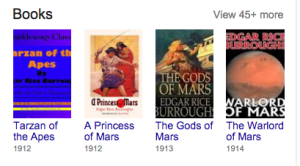Estate Planning for Copyright Owners by Kelley Way
 Today we welcome a returning guest writer to Writer’s Fun Zone, Kelley Way who is stopping by to chat with us today about “Estate Planning for Copyright Owners.” Enjoy!
Today we welcome a returning guest writer to Writer’s Fun Zone, Kelley Way who is stopping by to chat with us today about “Estate Planning for Copyright Owners.” Enjoy!
***
Let’s face it, death is depressing. Thinking about your own death is doubly depressing. However, if you have a copyright that is making money, and you want it to stay profitable, you should have a plan in place for what will happen to it when you can no longer manage it yourself. If you don’t, then the copyright automatically passes to your statutory heirs – in most cases, your spouse and/or children. While this might not be objectionable on the surface, these people may not be able or willing to help the work reach its’ full potential. In addition, copyright ownership would be shared equally between all the heirs, which may lead to problems down the road. Finally, statutory heirs are not determined until they can exercise their rights (i.e. after the person’s death), so there is no guarantee that the copyright will go to the person or people that you want it to.
Three Methods A Copyright Owner Can Avoid These Problems
There are three methods by which a copyright owner can avoid these problems, each with their own strengths and weaknesses.
The first, and simplest on the front end, is to assign the copyright in your will. This insures that the copyright goes to the person you want it to go to, and it is protected from any attempts by statutory heirs to get it back via the termination right in §203 of the Copyright Act (which contains a specific exception for transfers by will).
For example, copyright owner Stan can will his copyright to his favorite charity, and Stan’s irresponsible son Will has no grounds to contest this, and cannot use the termination right to try to get the copyright back. The problem with this plan is that assigning the copyright in a will automatically places the estate in probate, which is a long and complicated process that most estate planners seek to avoid. It also does not plan for the possibility of Stan becoming incapacitated, e.g. getting hit by a car and falling into a coma, in which case there would be no one managing the copyright, though this could be remedied by an Advanced Health Care Directive giving someone a Power of Attorney over his assets.
The second method is to place the copyright into a trust, either before or upon the death of the copyright owner. This allows an impartial trustee to manage the copyright, while insuring that any revenue from the copyright goes to beneficiaries chosen by the copyright owner. This is a way for Stan to have his cake and eat it too: he can name his responsible brother Don as trustee, and have the profits from the copyright go to both his favorite charity and his son Will. The problem here is that the exception in the termination right statute only covers wills; while the intent likely covers trusts, they are not specifically named, and there is no case law yet to clarify this. This means that if Will decides he doesn’t want to share profits with the charity, he could potentially exercise his termination right and have the copyright taken out of the trust and given to him.
The third and final method is to create a corporation to assign the copyright to, or simply to manage the copyright. This is a particularly good option if you have several very successful copyrights (for example, Edgar Rice Burroughs, the author of the Tarzan series, did this, as did the Elvis Presley Trust).
There are several tax advantages to this method, and you can be fairly certain that your works will be marketed to their fullest. The disadvantages are that the profits would go to the company and shareholders rather than to your desired beneficiaries (unless you put a stipulation in the company bylaws, and/or the intended beneficiaries are the shareholders, both of which have their own potential problems).
This method also necessitates that the copyright be reasonably successful before the corporation is created; if there’s not enough work to keep one or more people busy managing the copyright full-time, it’s probably not worth it.
Finally, this method would also be subject to the termination right in §203 of the Copyright Act.
These are all viable methods, but none of them are foolproof. It’s best to consult with an attorney to determine which of these options is the right fit for you.
***
ABOUT THE AUTHOR
 Kelley Way was born and raised in Walnut Creek, California. She graduated from UC Davis with a B.A. in English, followed by a Juris Doctorate. Kelley is a member of the California Bar, and an aspiring writer of young adult fantasy novels. She can be contacted at KelleyAWay@gmail.com.
Kelley Way was born and raised in Walnut Creek, California. She graduated from UC Davis with a B.A. in English, followed by a Juris Doctorate. Kelley is a member of the California Bar, and an aspiring writer of young adult fantasy novels. She can be contacted at KelleyAWay@gmail.com.






